Exploring Ethical Issues, Theories, and Moral Dilemmas in Healthcare
VerifiedAdded on 2023/06/18
|9
|3126
|50
Report
AI Summary
This report provides a comprehensive overview of ethical issues, moral dilemmas, and relevant ethical theories and principles within health and social care settings. It examines issues such as patient privacy, confidentiality, end-of-life decisions, informed consent, and malpractice, and discusses ethical frameworks like utilitarianism, deontology, and consequentialism. The report also explores the influence of personal morals and values on professional practice, emphasizing the importance of confidentiality and informed consent in delivering effective and ethical healthcare services. The goal is to provide insights into navigating complex ethical challenges faced by healthcare professionals and promoting best practices in patient care. Desklib offers this and other solved assignments to aid students in their studies.
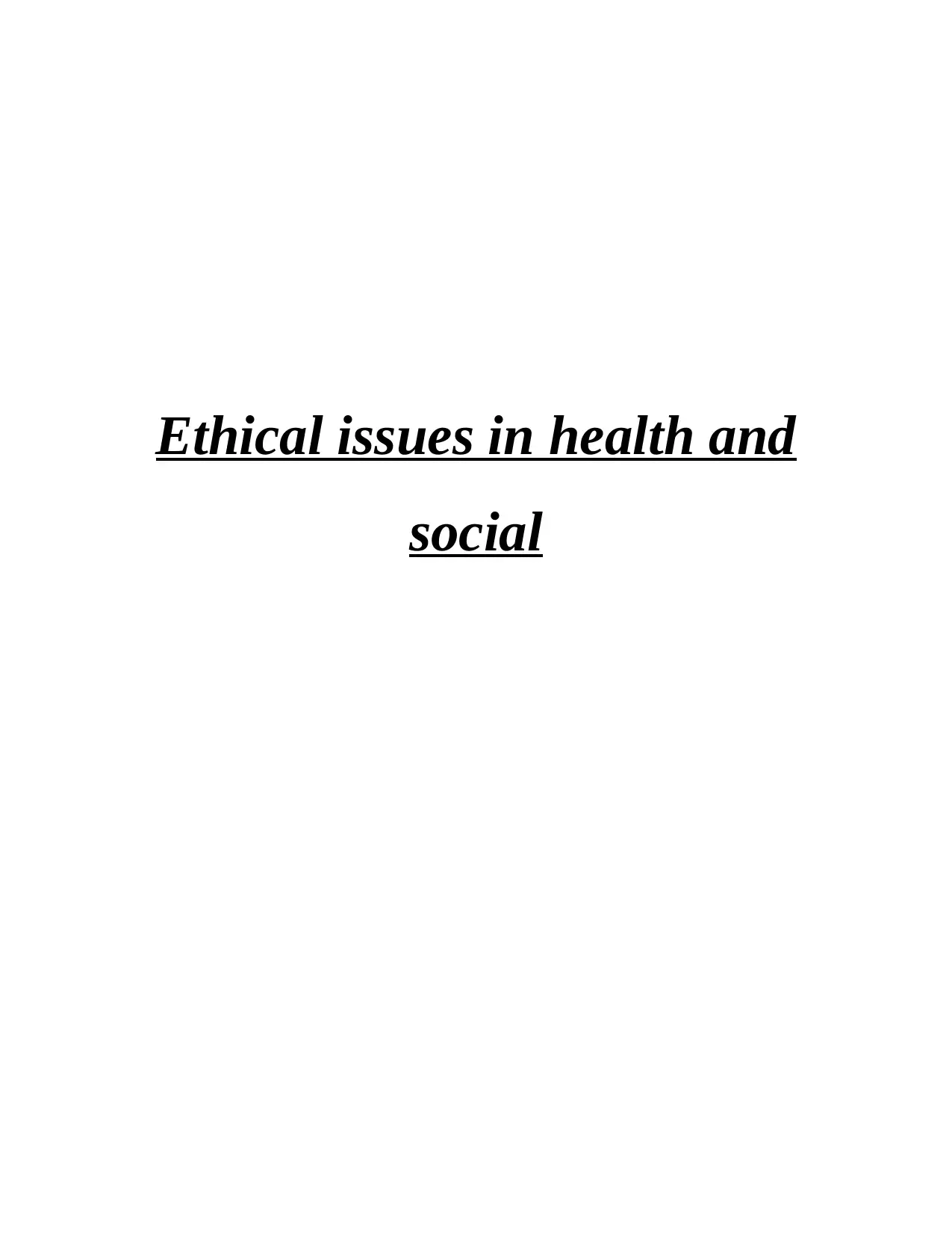
Ethical issues in health and
social
social
Paraphrase This Document
Need a fresh take? Get an instant paraphrase of this document with our AI Paraphraser
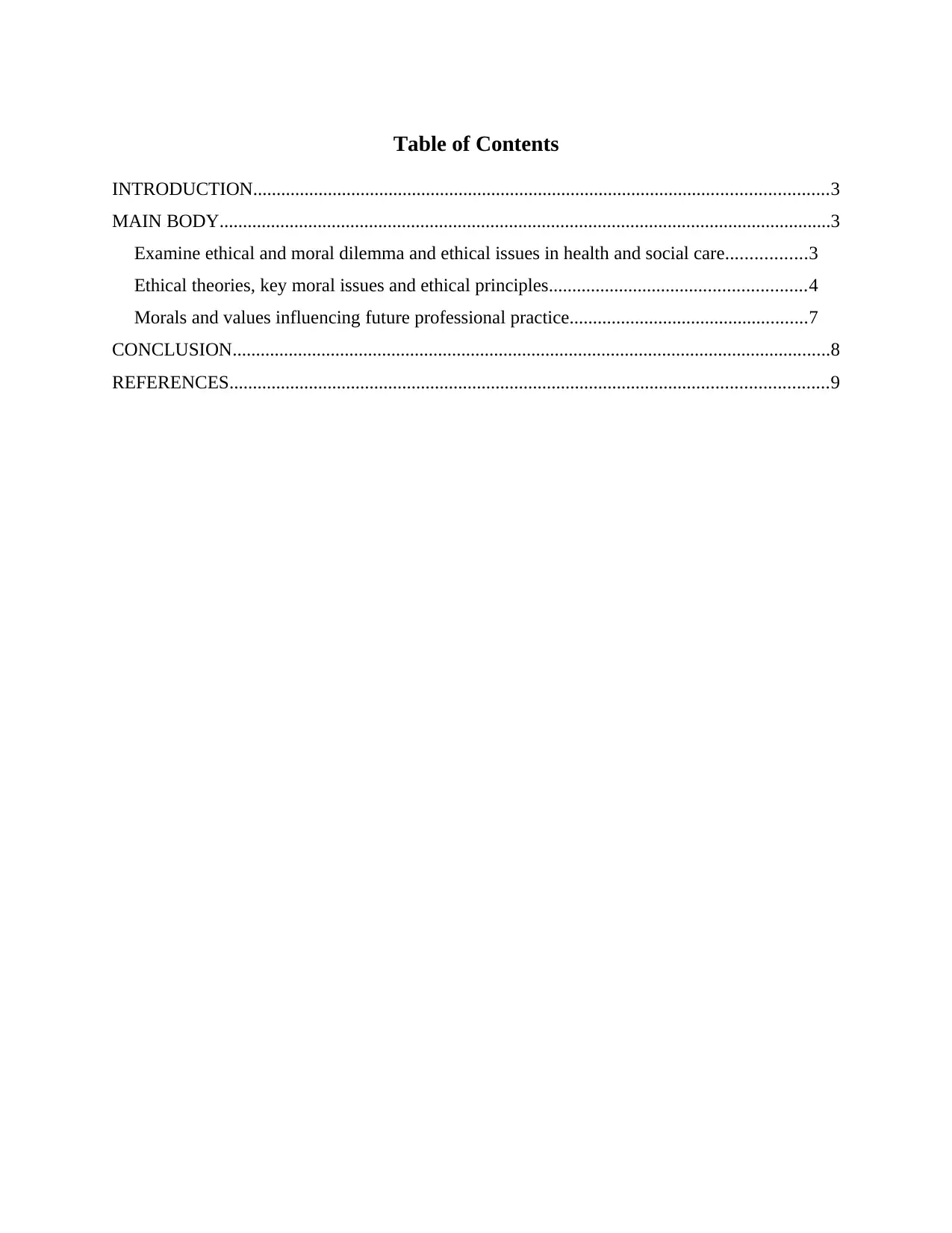
Table of Contents
INTRODUCTION...........................................................................................................................3
MAIN BODY...................................................................................................................................3
Examine ethical and moral dilemma and ethical issues in health and social care.................3
Ethical theories, key moral issues and ethical principles.......................................................4
Morals and values influencing future professional practice...................................................7
CONCLUSION................................................................................................................................8
REFERENCES................................................................................................................................9
INTRODUCTION...........................................................................................................................3
MAIN BODY...................................................................................................................................3
Examine ethical and moral dilemma and ethical issues in health and social care.................3
Ethical theories, key moral issues and ethical principles.......................................................4
Morals and values influencing future professional practice...................................................7
CONCLUSION................................................................................................................................8
REFERENCES................................................................................................................................9
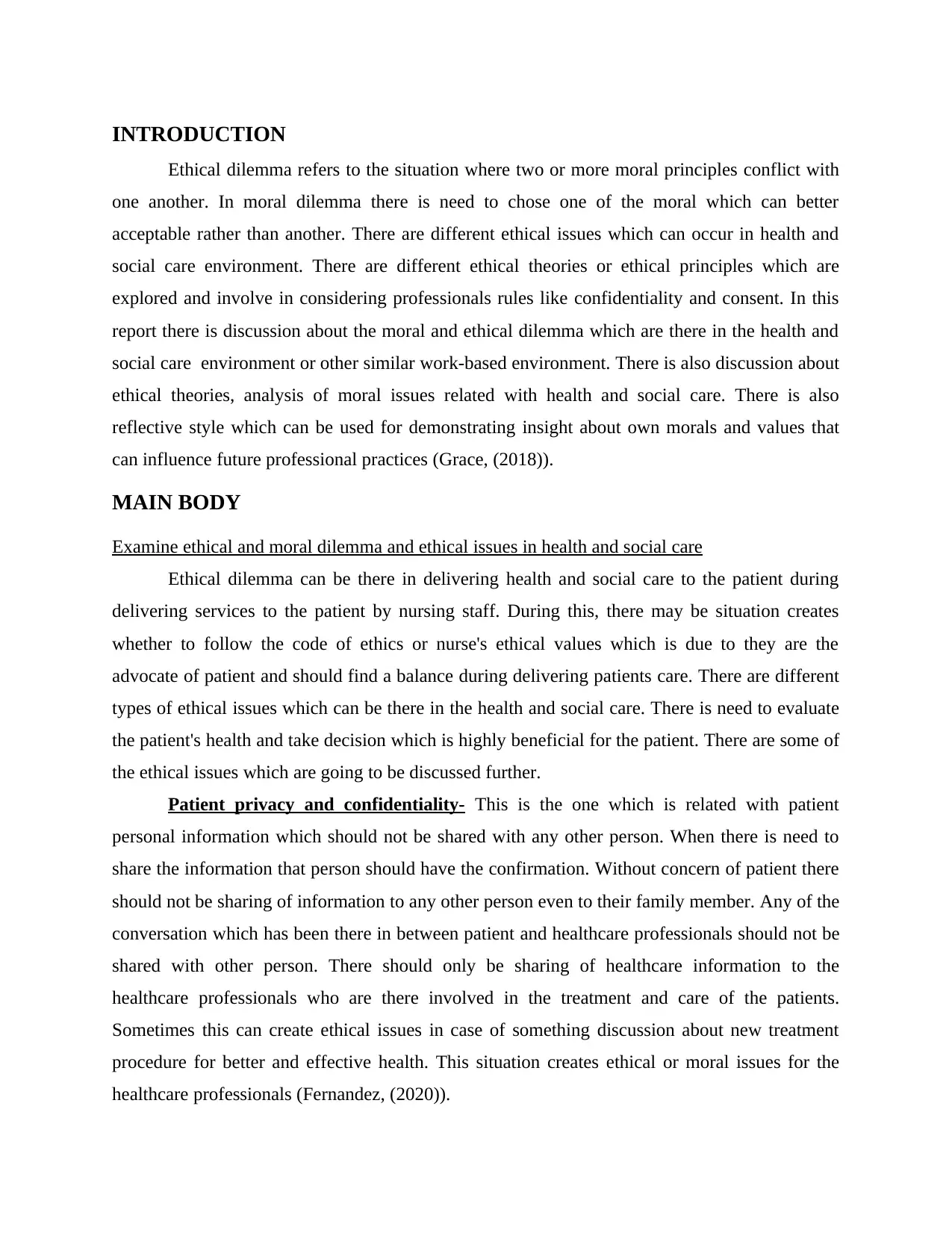
INTRODUCTION
Ethical dilemma refers to the situation where two or more moral principles conflict with
one another. In moral dilemma there is need to chose one of the moral which can better
acceptable rather than another. There are different ethical issues which can occur in health and
social care environment. There are different ethical theories or ethical principles which are
explored and involve in considering professionals rules like confidentiality and consent. In this
report there is discussion about the moral and ethical dilemma which are there in the health and
social care environment or other similar work-based environment. There is also discussion about
ethical theories, analysis of moral issues related with health and social care. There is also
reflective style which can be used for demonstrating insight about own morals and values that
can influence future professional practices (Grace, (2018)).
MAIN BODY
Examine ethical and moral dilemma and ethical issues in health and social care
Ethical dilemma can be there in delivering health and social care to the patient during
delivering services to the patient by nursing staff. During this, there may be situation creates
whether to follow the code of ethics or nurse's ethical values which is due to they are the
advocate of patient and should find a balance during delivering patients care. There are different
types of ethical issues which can be there in the health and social care. There is need to evaluate
the patient's health and take decision which is highly beneficial for the patient. There are some of
the ethical issues which are going to be discussed further.
Patient privacy and confidentiality- This is the one which is related with patient
personal information which should not be shared with any other person. When there is need to
share the information that person should have the confirmation. Without concern of patient there
should not be sharing of information to any other person even to their family member. Any of the
conversation which has been there in between patient and healthcare professionals should not be
shared with other person. There should only be sharing of healthcare information to the
healthcare professionals who are there involved in the treatment and care of the patients.
Sometimes this can create ethical issues in case of something discussion about new treatment
procedure for better and effective health. This situation creates ethical or moral issues for the
healthcare professionals (Fernandez, (2020)).
Ethical dilemma refers to the situation where two or more moral principles conflict with
one another. In moral dilemma there is need to chose one of the moral which can better
acceptable rather than another. There are different ethical issues which can occur in health and
social care environment. There are different ethical theories or ethical principles which are
explored and involve in considering professionals rules like confidentiality and consent. In this
report there is discussion about the moral and ethical dilemma which are there in the health and
social care environment or other similar work-based environment. There is also discussion about
ethical theories, analysis of moral issues related with health and social care. There is also
reflective style which can be used for demonstrating insight about own morals and values that
can influence future professional practices (Grace, (2018)).
MAIN BODY
Examine ethical and moral dilemma and ethical issues in health and social care
Ethical dilemma can be there in delivering health and social care to the patient during
delivering services to the patient by nursing staff. During this, there may be situation creates
whether to follow the code of ethics or nurse's ethical values which is due to they are the
advocate of patient and should find a balance during delivering patients care. There are different
types of ethical issues which can be there in the health and social care. There is need to evaluate
the patient's health and take decision which is highly beneficial for the patient. There are some of
the ethical issues which are going to be discussed further.
Patient privacy and confidentiality- This is the one which is related with patient
personal information which should not be shared with any other person. When there is need to
share the information that person should have the confirmation. Without concern of patient there
should not be sharing of information to any other person even to their family member. Any of the
conversation which has been there in between patient and healthcare professionals should not be
shared with other person. There should only be sharing of healthcare information to the
healthcare professionals who are there involved in the treatment and care of the patients.
Sometimes this can create ethical issues in case of something discussion about new treatment
procedure for better and effective health. This situation creates ethical or moral issues for the
healthcare professionals (Fernandez, (2020)).
⊘ This is a preview!⊘
Do you want full access?
Subscribe today to unlock all pages.

Trusted by 1+ million students worldwide
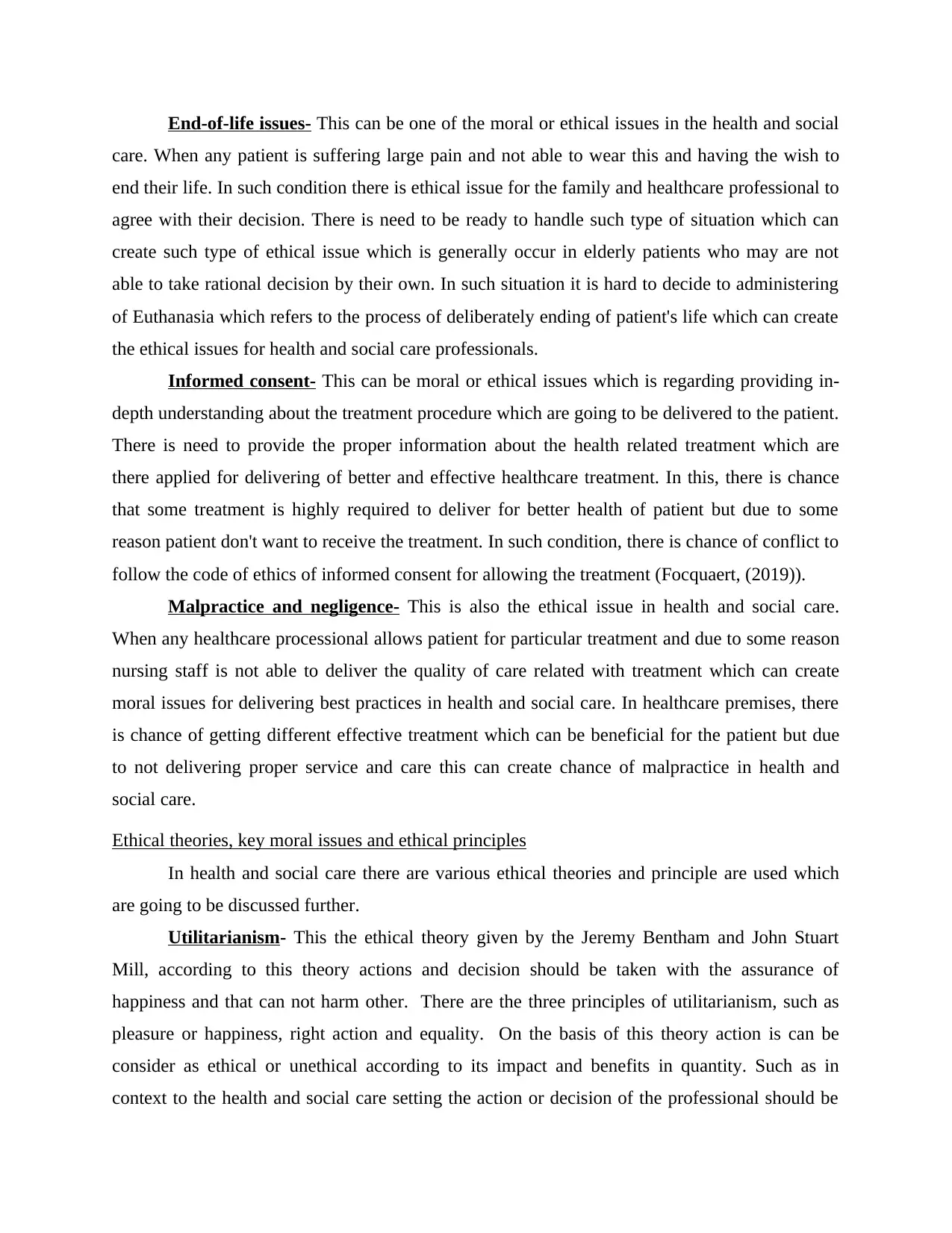
End-of-life issues- This can be one of the moral or ethical issues in the health and social
care. When any patient is suffering large pain and not able to wear this and having the wish to
end their life. In such condition there is ethical issue for the family and healthcare professional to
agree with their decision. There is need to be ready to handle such type of situation which can
create such type of ethical issue which is generally occur in elderly patients who may are not
able to take rational decision by their own. In such situation it is hard to decide to administering
of Euthanasia which refers to the process of deliberately ending of patient's life which can create
the ethical issues for health and social care professionals.
Informed consent- This can be moral or ethical issues which is regarding providing in-
depth understanding about the treatment procedure which are going to be delivered to the patient.
There is need to provide the proper information about the health related treatment which are
there applied for delivering of better and effective healthcare treatment. In this, there is chance
that some treatment is highly required to deliver for better health of patient but due to some
reason patient don't want to receive the treatment. In such condition, there is chance of conflict to
follow the code of ethics of informed consent for allowing the treatment (Focquaert, (2019)).
Malpractice and negligence- This is also the ethical issue in health and social care.
When any healthcare processional allows patient for particular treatment and due to some reason
nursing staff is not able to deliver the quality of care related with treatment which can create
moral issues for delivering best practices in health and social care. In healthcare premises, there
is chance of getting different effective treatment which can be beneficial for the patient but due
to not delivering proper service and care this can create chance of malpractice in health and
social care.
Ethical theories, key moral issues and ethical principles
In health and social care there are various ethical theories and principle are used which
are going to be discussed further.
Utilitarianism- This the ethical theory given by the Jeremy Bentham and John Stuart
Mill, according to this theory actions and decision should be taken with the assurance of
happiness and that can not harm other. There are the three principles of utilitarianism, such as
pleasure or happiness, right action and equality. On the basis of this theory action is can be
consider as ethical or unethical according to its impact and benefits in quantity. Such as in
context to the health and social care setting the action or decision of the professional should be
care. When any patient is suffering large pain and not able to wear this and having the wish to
end their life. In such condition there is ethical issue for the family and healthcare professional to
agree with their decision. There is need to be ready to handle such type of situation which can
create such type of ethical issue which is generally occur in elderly patients who may are not
able to take rational decision by their own. In such situation it is hard to decide to administering
of Euthanasia which refers to the process of deliberately ending of patient's life which can create
the ethical issues for health and social care professionals.
Informed consent- This can be moral or ethical issues which is regarding providing in-
depth understanding about the treatment procedure which are going to be delivered to the patient.
There is need to provide the proper information about the health related treatment which are
there applied for delivering of better and effective healthcare treatment. In this, there is chance
that some treatment is highly required to deliver for better health of patient but due to some
reason patient don't want to receive the treatment. In such condition, there is chance of conflict to
follow the code of ethics of informed consent for allowing the treatment (Focquaert, (2019)).
Malpractice and negligence- This is also the ethical issue in health and social care.
When any healthcare processional allows patient for particular treatment and due to some reason
nursing staff is not able to deliver the quality of care related with treatment which can create
moral issues for delivering best practices in health and social care. In healthcare premises, there
is chance of getting different effective treatment which can be beneficial for the patient but due
to not delivering proper service and care this can create chance of malpractice in health and
social care.
Ethical theories, key moral issues and ethical principles
In health and social care there are various ethical theories and principle are used which
are going to be discussed further.
Utilitarianism- This the ethical theory given by the Jeremy Bentham and John Stuart
Mill, according to this theory actions and decision should be taken with the assurance of
happiness and that can not harm other. There are the three principles of utilitarianism, such as
pleasure or happiness, right action and equality. On the basis of this theory action is can be
consider as ethical or unethical according to its impact and benefits in quantity. Such as in
context to the health and social care setting the action or decision of the professional should be
Paraphrase This Document
Need a fresh take? Get an instant paraphrase of this document with our AI Paraphraser
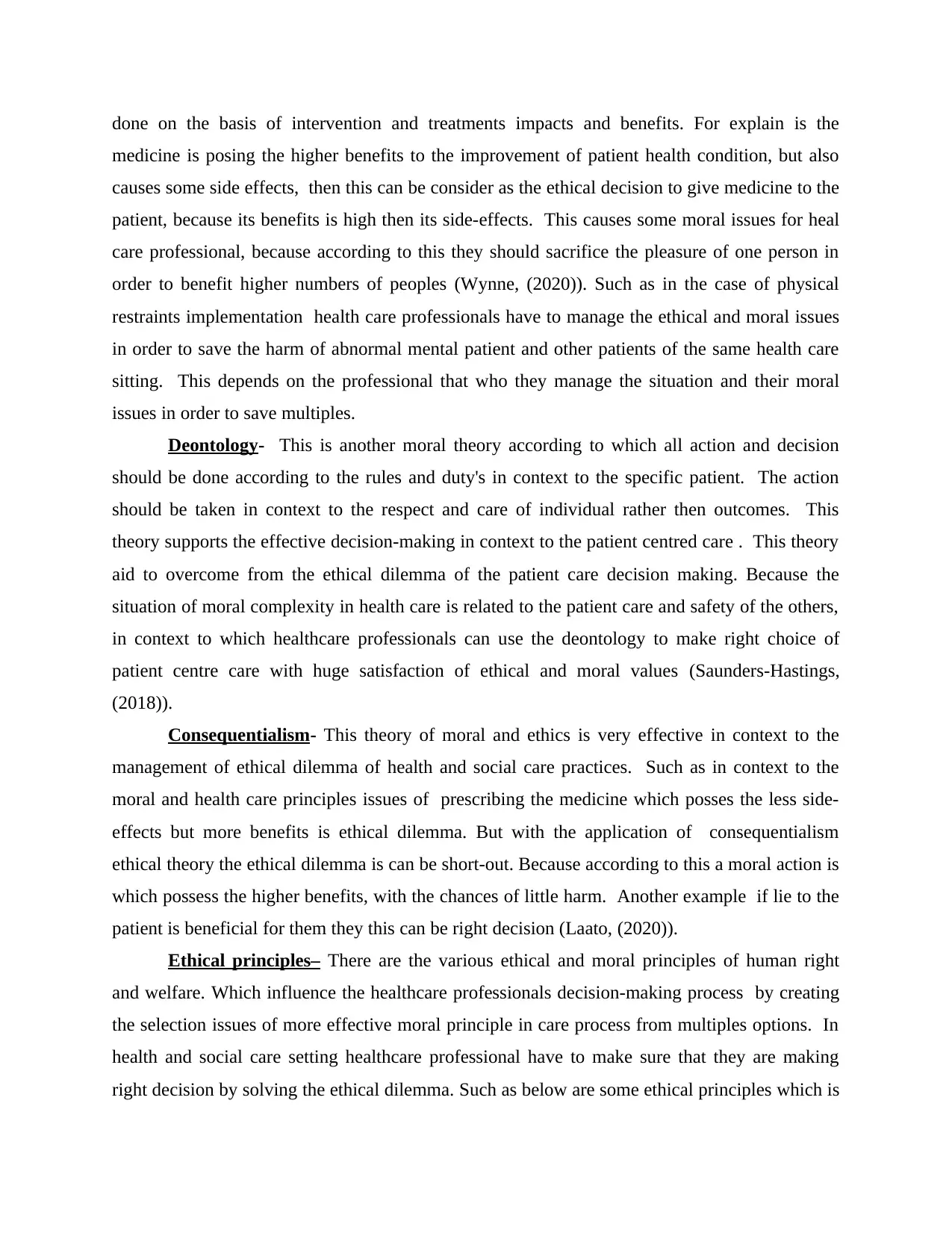
done on the basis of intervention and treatments impacts and benefits. For explain is the
medicine is posing the higher benefits to the improvement of patient health condition, but also
causes some side effects, then this can be consider as the ethical decision to give medicine to the
patient, because its benefits is high then its side-effects. This causes some moral issues for heal
care professional, because according to this they should sacrifice the pleasure of one person in
order to benefit higher numbers of peoples (Wynne, (2020)). Such as in the case of physical
restraints implementation health care professionals have to manage the ethical and moral issues
in order to save the harm of abnormal mental patient and other patients of the same health care
sitting. This depends on the professional that who they manage the situation and their moral
issues in order to save multiples.
Deontology- This is another moral theory according to which all action and decision
should be done according to the rules and duty's in context to the specific patient. The action
should be taken in context to the respect and care of individual rather then outcomes. This
theory supports the effective decision-making in context to the patient centred care . This theory
aid to overcome from the ethical dilemma of the patient care decision making. Because the
situation of moral complexity in health care is related to the patient care and safety of the others,
in context to which healthcare professionals can use the deontology to make right choice of
patient centre care with huge satisfaction of ethical and moral values (Saunders-Hastings,
(2018)).
Consequentialism- This theory of moral and ethics is very effective in context to the
management of ethical dilemma of health and social care practices. Such as in context to the
moral and health care principles issues of prescribing the medicine which posses the less side-
effects but more benefits is ethical dilemma. But with the application of consequentialism
ethical theory the ethical dilemma is can be short-out. Because according to this a moral action is
which possess the higher benefits, with the chances of little harm. Another example if lie to the
patient is beneficial for them they this can be right decision (Laato, (2020)).
Ethical principles– There are the various ethical and moral principles of human right
and welfare. Which influence the healthcare professionals decision-making process by creating
the selection issues of more effective moral principle in care process from multiples options. In
health and social care setting healthcare professional have to make sure that they are making
right decision by solving the ethical dilemma. Such as below are some ethical principles which is
medicine is posing the higher benefits to the improvement of patient health condition, but also
causes some side effects, then this can be consider as the ethical decision to give medicine to the
patient, because its benefits is high then its side-effects. This causes some moral issues for heal
care professional, because according to this they should sacrifice the pleasure of one person in
order to benefit higher numbers of peoples (Wynne, (2020)). Such as in the case of physical
restraints implementation health care professionals have to manage the ethical and moral issues
in order to save the harm of abnormal mental patient and other patients of the same health care
sitting. This depends on the professional that who they manage the situation and their moral
issues in order to save multiples.
Deontology- This is another moral theory according to which all action and decision
should be done according to the rules and duty's in context to the specific patient. The action
should be taken in context to the respect and care of individual rather then outcomes. This
theory supports the effective decision-making in context to the patient centred care . This theory
aid to overcome from the ethical dilemma of the patient care decision making. Because the
situation of moral complexity in health care is related to the patient care and safety of the others,
in context to which healthcare professionals can use the deontology to make right choice of
patient centre care with huge satisfaction of ethical and moral values (Saunders-Hastings,
(2018)).
Consequentialism- This theory of moral and ethics is very effective in context to the
management of ethical dilemma of health and social care practices. Such as in context to the
moral and health care principles issues of prescribing the medicine which posses the less side-
effects but more benefits is ethical dilemma. But with the application of consequentialism
ethical theory the ethical dilemma is can be short-out. Because according to this a moral action is
which possess the higher benefits, with the chances of little harm. Another example if lie to the
patient is beneficial for them they this can be right decision (Laato, (2020)).
Ethical principles– There are the various ethical and moral principles of human right
and welfare. Which influence the healthcare professionals decision-making process by creating
the selection issues of more effective moral principle in care process from multiples options. In
health and social care setting healthcare professional have to make sure that they are making
right decision by solving the ethical dilemma. Such as below are some ethical principles which is
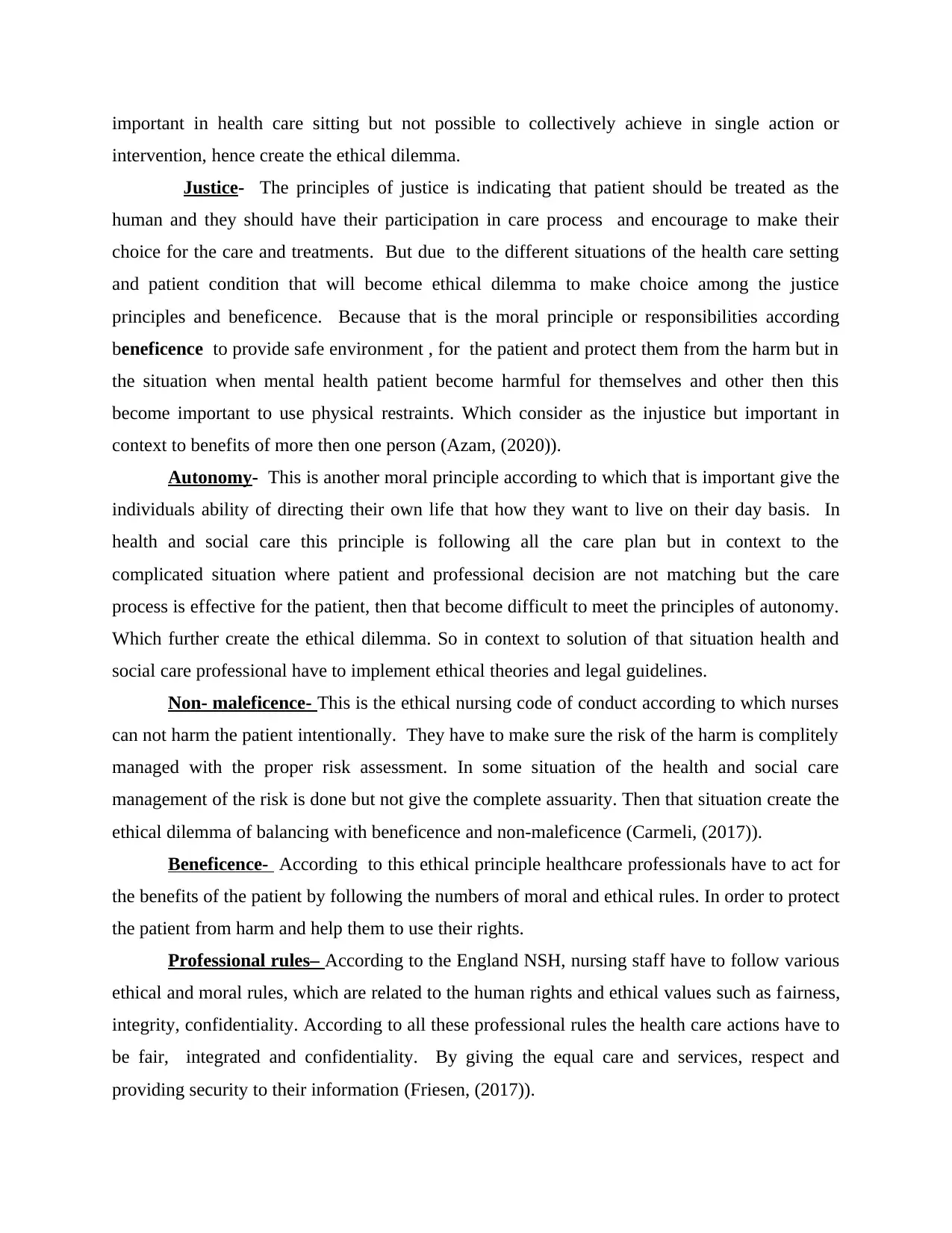
important in health care sitting but not possible to collectively achieve in single action or
intervention, hence create the ethical dilemma.
Justice- The principles of justice is indicating that patient should be treated as the
human and they should have their participation in care process and encourage to make their
choice for the care and treatments. But due to the different situations of the health care setting
and patient condition that will become ethical dilemma to make choice among the justice
principles and beneficence. Because that is the moral principle or responsibilities according
beneficence to provide safe environment , for the patient and protect them from the harm but in
the situation when mental health patient become harmful for themselves and other then this
become important to use physical restraints. Which consider as the injustice but important in
context to benefits of more then one person (Azam, (2020)).
Autonomy- This is another moral principle according to which that is important give the
individuals ability of directing their own life that how they want to live on their day basis. In
health and social care this principle is following all the care plan but in context to the
complicated situation where patient and professional decision are not matching but the care
process is effective for the patient, then that become difficult to meet the principles of autonomy.
Which further create the ethical dilemma. So in context to solution of that situation health and
social care professional have to implement ethical theories and legal guidelines.
Non- maleficence- This is the ethical nursing code of conduct according to which nurses
can not harm the patient intentionally. They have to make sure the risk of the harm is complitely
managed with the proper risk assessment. In some situation of the health and social care
management of the risk is done but not give the complete assuarity. Then that situation create the
ethical dilemma of balancing with beneficence and non-maleficence (Carmeli, (2017)).
Beneficence- According to this ethical principle healthcare professionals have to act for
the benefits of the patient by following the numbers of moral and ethical rules. In order to protect
the patient from harm and help them to use their rights.
Professional rules– According to the England NSH, nursing staff have to follow various
ethical and moral rules, which are related to the human rights and ethical values such as fairness,
integrity, confidentiality. According to all these professional rules the health care actions have to
be fair, integrated and confidentiality. By giving the equal care and services, respect and
providing security to their information (Friesen, (2017)).
intervention, hence create the ethical dilemma.
Justice- The principles of justice is indicating that patient should be treated as the
human and they should have their participation in care process and encourage to make their
choice for the care and treatments. But due to the different situations of the health care setting
and patient condition that will become ethical dilemma to make choice among the justice
principles and beneficence. Because that is the moral principle or responsibilities according
beneficence to provide safe environment , for the patient and protect them from the harm but in
the situation when mental health patient become harmful for themselves and other then this
become important to use physical restraints. Which consider as the injustice but important in
context to benefits of more then one person (Azam, (2020)).
Autonomy- This is another moral principle according to which that is important give the
individuals ability of directing their own life that how they want to live on their day basis. In
health and social care this principle is following all the care plan but in context to the
complicated situation where patient and professional decision are not matching but the care
process is effective for the patient, then that become difficult to meet the principles of autonomy.
Which further create the ethical dilemma. So in context to solution of that situation health and
social care professional have to implement ethical theories and legal guidelines.
Non- maleficence- This is the ethical nursing code of conduct according to which nurses
can not harm the patient intentionally. They have to make sure the risk of the harm is complitely
managed with the proper risk assessment. In some situation of the health and social care
management of the risk is done but not give the complete assuarity. Then that situation create the
ethical dilemma of balancing with beneficence and non-maleficence (Carmeli, (2017)).
Beneficence- According to this ethical principle healthcare professionals have to act for
the benefits of the patient by following the numbers of moral and ethical rules. In order to protect
the patient from harm and help them to use their rights.
Professional rules– According to the England NSH, nursing staff have to follow various
ethical and moral rules, which are related to the human rights and ethical values such as fairness,
integrity, confidentiality. According to all these professional rules the health care actions have to
be fair, integrated and confidentiality. By giving the equal care and services, respect and
providing security to their information (Friesen, (2017)).
⊘ This is a preview!⊘
Do you want full access?
Subscribe today to unlock all pages.

Trusted by 1+ million students worldwide
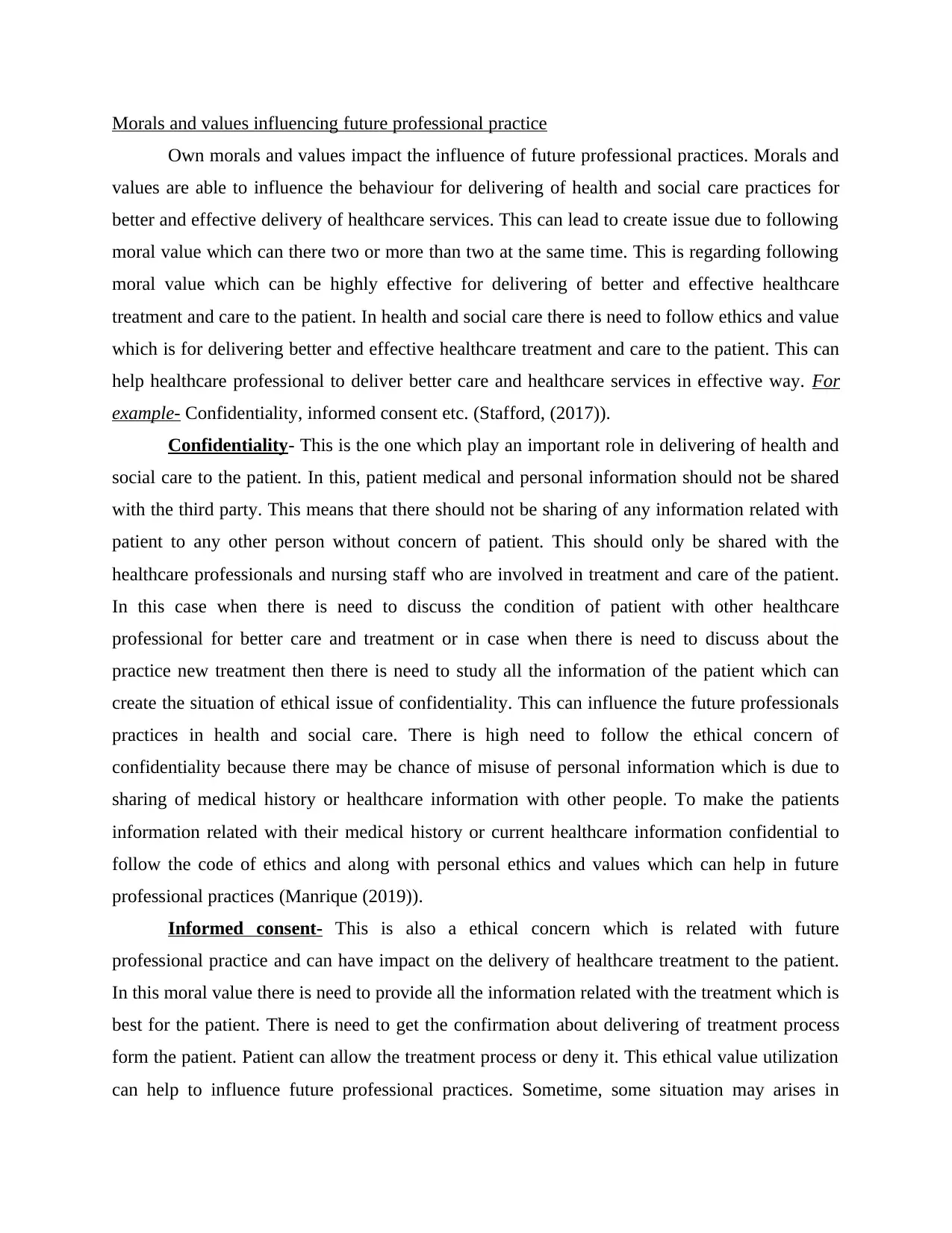
Morals and values influencing future professional practice
Own morals and values impact the influence of future professional practices. Morals and
values are able to influence the behaviour for delivering of health and social care practices for
better and effective delivery of healthcare services. This can lead to create issue due to following
moral value which can there two or more than two at the same time. This is regarding following
moral value which can be highly effective for delivering of better and effective healthcare
treatment and care to the patient. In health and social care there is need to follow ethics and value
which is for delivering better and effective healthcare treatment and care to the patient. This can
help healthcare professional to deliver better care and healthcare services in effective way. For
example- Confidentiality, informed consent etc. (Stafford, (2017)).
Confidentiality- This is the one which play an important role in delivering of health and
social care to the patient. In this, patient medical and personal information should not be shared
with the third party. This means that there should not be sharing of any information related with
patient to any other person without concern of patient. This should only be shared with the
healthcare professionals and nursing staff who are involved in treatment and care of the patient.
In this case when there is need to discuss the condition of patient with other healthcare
professional for better care and treatment or in case when there is need to discuss about the
practice new treatment then there is need to study all the information of the patient which can
create the situation of ethical issue of confidentiality. This can influence the future professionals
practices in health and social care. There is high need to follow the ethical concern of
confidentiality because there may be chance of misuse of personal information which is due to
sharing of medical history or healthcare information with other people. To make the patients
information related with their medical history or current healthcare information confidential to
follow the code of ethics and along with personal ethics and values which can help in future
professional practices (Manrique (2019)).
Informed consent- This is also a ethical concern which is related with future
professional practice and can have impact on the delivery of healthcare treatment to the patient.
In this moral value there is need to provide all the information related with the treatment which is
best for the patient. There is need to get the confirmation about delivering of treatment process
form the patient. Patient can allow the treatment process or deny it. This ethical value utilization
can help to influence future professional practices. Sometime, some situation may arises in
Own morals and values impact the influence of future professional practices. Morals and
values are able to influence the behaviour for delivering of health and social care practices for
better and effective delivery of healthcare services. This can lead to create issue due to following
moral value which can there two or more than two at the same time. This is regarding following
moral value which can be highly effective for delivering of better and effective healthcare
treatment and care to the patient. In health and social care there is need to follow ethics and value
which is for delivering better and effective healthcare treatment and care to the patient. This can
help healthcare professional to deliver better care and healthcare services in effective way. For
example- Confidentiality, informed consent etc. (Stafford, (2017)).
Confidentiality- This is the one which play an important role in delivering of health and
social care to the patient. In this, patient medical and personal information should not be shared
with the third party. This means that there should not be sharing of any information related with
patient to any other person without concern of patient. This should only be shared with the
healthcare professionals and nursing staff who are involved in treatment and care of the patient.
In this case when there is need to discuss the condition of patient with other healthcare
professional for better care and treatment or in case when there is need to discuss about the
practice new treatment then there is need to study all the information of the patient which can
create the situation of ethical issue of confidentiality. This can influence the future professionals
practices in health and social care. There is high need to follow the ethical concern of
confidentiality because there may be chance of misuse of personal information which is due to
sharing of medical history or healthcare information with other people. To make the patients
information related with their medical history or current healthcare information confidential to
follow the code of ethics and along with personal ethics and values which can help in future
professional practices (Manrique (2019)).
Informed consent- This is also a ethical concern which is related with future
professional practice and can have impact on the delivery of healthcare treatment to the patient.
In this moral value there is need to provide all the information related with the treatment which is
best for the patient. There is need to get the confirmation about delivering of treatment process
form the patient. Patient can allow the treatment process or deny it. This ethical value utilization
can help to influence future professional practices. Sometime, some situation may arises in
Paraphrase This Document
Need a fresh take? Get an instant paraphrase of this document with our AI Paraphraser
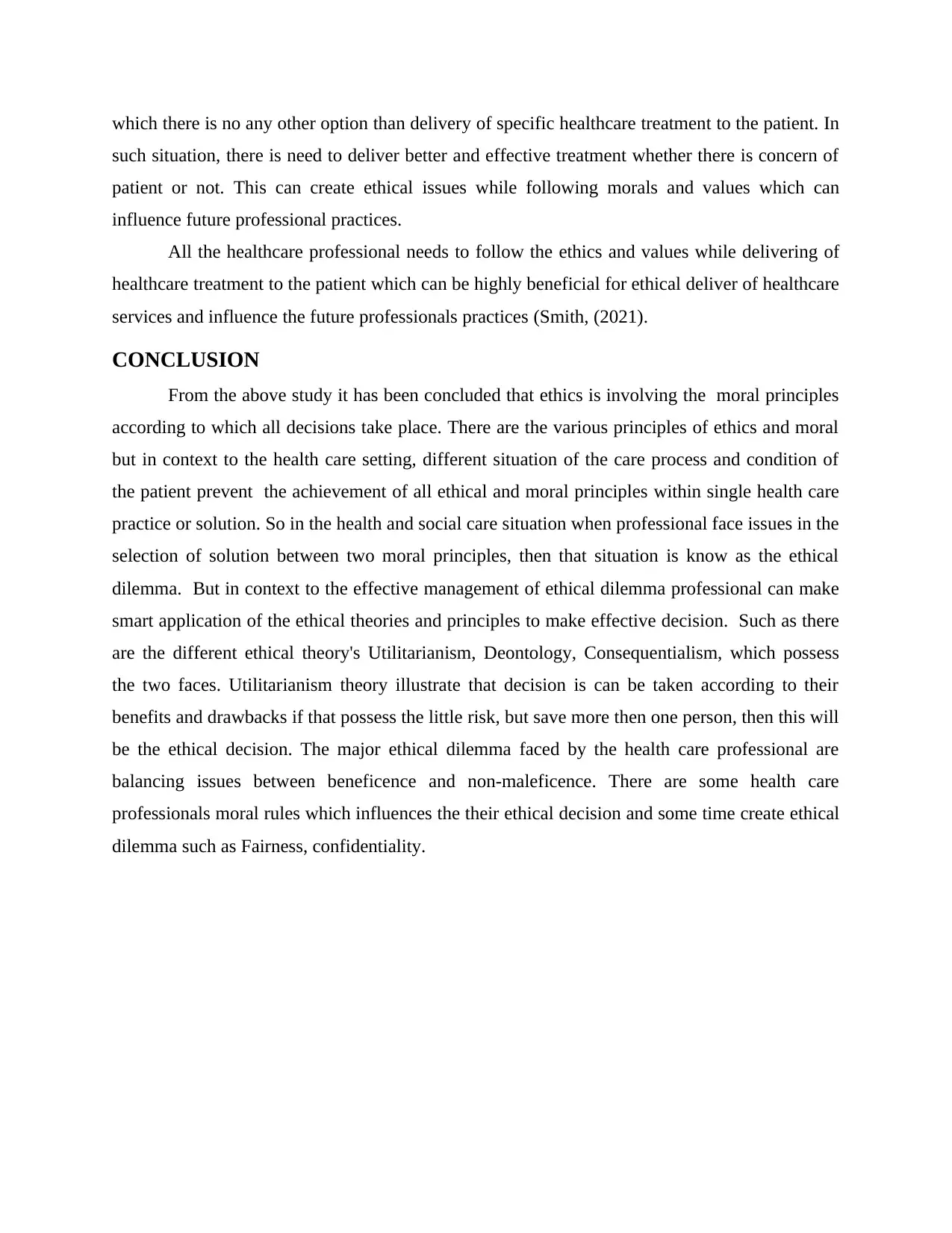
which there is no any other option than delivery of specific healthcare treatment to the patient. In
such situation, there is need to deliver better and effective treatment whether there is concern of
patient or not. This can create ethical issues while following morals and values which can
influence future professional practices.
All the healthcare professional needs to follow the ethics and values while delivering of
healthcare treatment to the patient which can be highly beneficial for ethical deliver of healthcare
services and influence the future professionals practices (Smith, (2021).
CONCLUSION
From the above study it has been concluded that ethics is involving the moral principles
according to which all decisions take place. There are the various principles of ethics and moral
but in context to the health care setting, different situation of the care process and condition of
the patient prevent the achievement of all ethical and moral principles within single health care
practice or solution. So in the health and social care situation when professional face issues in the
selection of solution between two moral principles, then that situation is know as the ethical
dilemma. But in context to the effective management of ethical dilemma professional can make
smart application of the ethical theories and principles to make effective decision. Such as there
are the different ethical theory's Utilitarianism, Deontology, Consequentialism, which possess
the two faces. Utilitarianism theory illustrate that decision is can be taken according to their
benefits and drawbacks if that possess the little risk, but save more then one person, then this will
be the ethical decision. The major ethical dilemma faced by the health care professional are
balancing issues between beneficence and non-maleficence. There are some health care
professionals moral rules which influences the their ethical decision and some time create ethical
dilemma such as Fairness, confidentiality.
such situation, there is need to deliver better and effective treatment whether there is concern of
patient or not. This can create ethical issues while following morals and values which can
influence future professional practices.
All the healthcare professional needs to follow the ethics and values while delivering of
healthcare treatment to the patient which can be highly beneficial for ethical deliver of healthcare
services and influence the future professionals practices (Smith, (2021).
CONCLUSION
From the above study it has been concluded that ethics is involving the moral principles
according to which all decisions take place. There are the various principles of ethics and moral
but in context to the health care setting, different situation of the care process and condition of
the patient prevent the achievement of all ethical and moral principles within single health care
practice or solution. So in the health and social care situation when professional face issues in the
selection of solution between two moral principles, then that situation is know as the ethical
dilemma. But in context to the effective management of ethical dilemma professional can make
smart application of the ethical theories and principles to make effective decision. Such as there
are the different ethical theory's Utilitarianism, Deontology, Consequentialism, which possess
the two faces. Utilitarianism theory illustrate that decision is can be taken according to their
benefits and drawbacks if that possess the little risk, but save more then one person, then this will
be the ethical decision. The major ethical dilemma faced by the health care professional are
balancing issues between beneficence and non-maleficence. There are some health care
professionals moral rules which influences the their ethical decision and some time create ethical
dilemma such as Fairness, confidentiality.
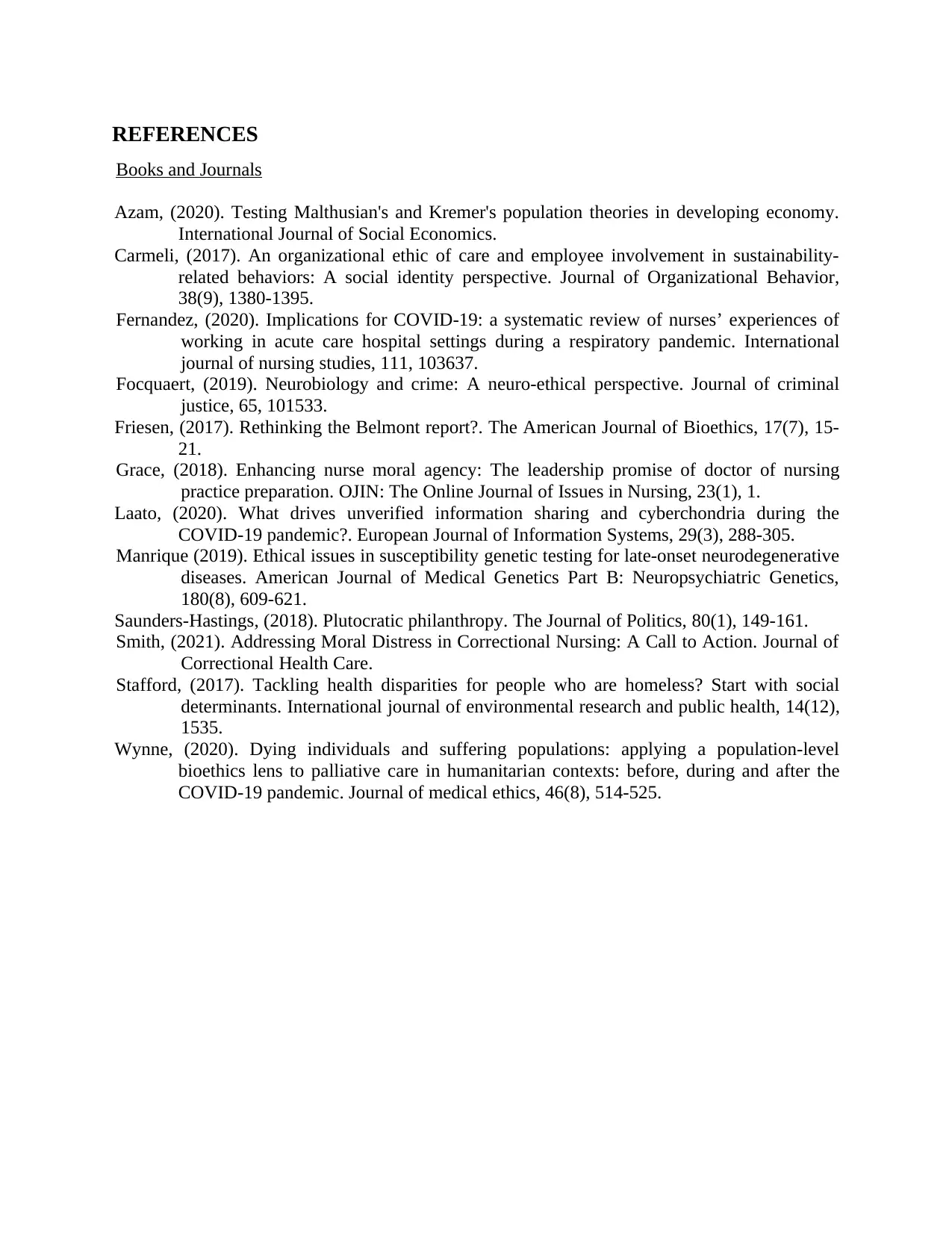
REFERENCES
Books and Journals
Azam, (2020). Testing Malthusian's and Kremer's population theories in developing economy.
International Journal of Social Economics.
Carmeli, (2017). An organizational ethic of care and employee involvement in sustainability‐
related behaviors: A social identity perspective. Journal of Organizational Behavior,
38(9), 1380-1395.
Fernandez, (2020). Implications for COVID-19: a systematic review of nurses’ experiences of
working in acute care hospital settings during a respiratory pandemic. International
journal of nursing studies, 111, 103637.
Focquaert, (2019). Neurobiology and crime: A neuro-ethical perspective. Journal of criminal
justice, 65, 101533.
Friesen, (2017). Rethinking the Belmont report?. The American Journal of Bioethics, 17(7), 15-
21.
Grace, (2018). Enhancing nurse moral agency: The leadership promise of doctor of nursing
practice preparation. OJIN: The Online Journal of Issues in Nursing, 23(1), 1.
Laato, (2020). What drives unverified information sharing and cyberchondria during the
COVID-19 pandemic?. European Journal of Information Systems, 29(3), 288-305.
Manrique (2019). Ethical issues in susceptibility genetic testing for late‐onset neurodegenerative
diseases. American Journal of Medical Genetics Part B: Neuropsychiatric Genetics,
180(8), 609-621.
Saunders-Hastings, (2018). Plutocratic philanthropy. The Journal of Politics, 80(1), 149-161.
Smith, (2021). Addressing Moral Distress in Correctional Nursing: A Call to Action. Journal of
Correctional Health Care.
Stafford, (2017). Tackling health disparities for people who are homeless? Start with social
determinants. International journal of environmental research and public health, 14(12),
1535.
Wynne, (2020). Dying individuals and suffering populations: applying a population-level
bioethics lens to palliative care in humanitarian contexts: before, during and after the
COVID-19 pandemic. Journal of medical ethics, 46(8), 514-525.
Books and Journals
Azam, (2020). Testing Malthusian's and Kremer's population theories in developing economy.
International Journal of Social Economics.
Carmeli, (2017). An organizational ethic of care and employee involvement in sustainability‐
related behaviors: A social identity perspective. Journal of Organizational Behavior,
38(9), 1380-1395.
Fernandez, (2020). Implications for COVID-19: a systematic review of nurses’ experiences of
working in acute care hospital settings during a respiratory pandemic. International
journal of nursing studies, 111, 103637.
Focquaert, (2019). Neurobiology and crime: A neuro-ethical perspective. Journal of criminal
justice, 65, 101533.
Friesen, (2017). Rethinking the Belmont report?. The American Journal of Bioethics, 17(7), 15-
21.
Grace, (2018). Enhancing nurse moral agency: The leadership promise of doctor of nursing
practice preparation. OJIN: The Online Journal of Issues in Nursing, 23(1), 1.
Laato, (2020). What drives unverified information sharing and cyberchondria during the
COVID-19 pandemic?. European Journal of Information Systems, 29(3), 288-305.
Manrique (2019). Ethical issues in susceptibility genetic testing for late‐onset neurodegenerative
diseases. American Journal of Medical Genetics Part B: Neuropsychiatric Genetics,
180(8), 609-621.
Saunders-Hastings, (2018). Plutocratic philanthropy. The Journal of Politics, 80(1), 149-161.
Smith, (2021). Addressing Moral Distress in Correctional Nursing: A Call to Action. Journal of
Correctional Health Care.
Stafford, (2017). Tackling health disparities for people who are homeless? Start with social
determinants. International journal of environmental research and public health, 14(12),
1535.
Wynne, (2020). Dying individuals and suffering populations: applying a population-level
bioethics lens to palliative care in humanitarian contexts: before, during and after the
COVID-19 pandemic. Journal of medical ethics, 46(8), 514-525.
⊘ This is a preview!⊘
Do you want full access?
Subscribe today to unlock all pages.

Trusted by 1+ million students worldwide
1 out of 9
Related Documents
Your All-in-One AI-Powered Toolkit for Academic Success.
+13062052269
info@desklib.com
Available 24*7 on WhatsApp / Email
![[object Object]](/_next/static/media/star-bottom.7253800d.svg)
Unlock your academic potential
Copyright © 2020–2025 A2Z Services. All Rights Reserved. Developed and managed by ZUCOL.





